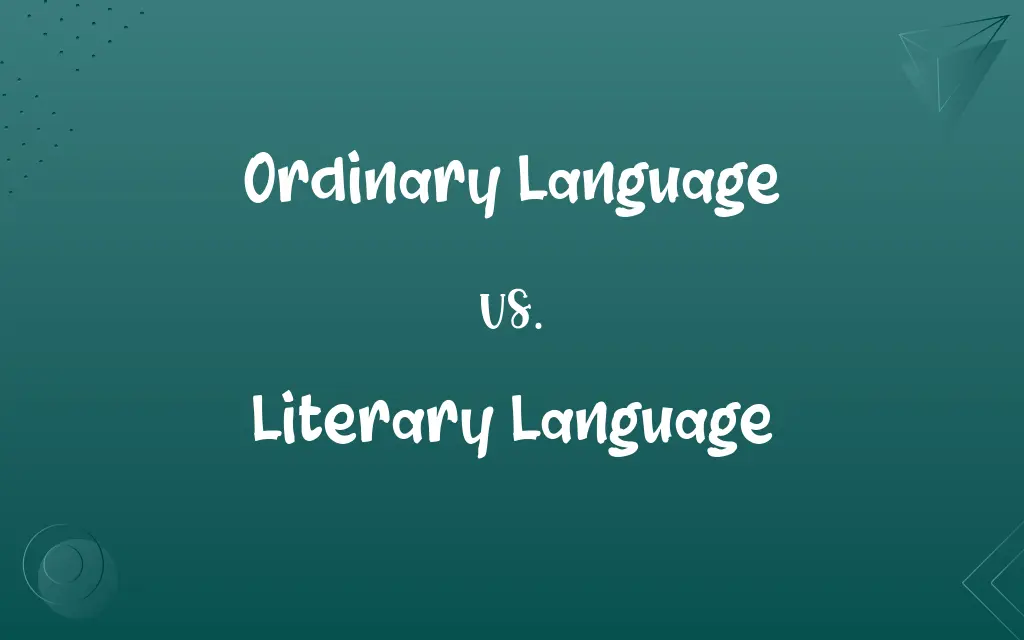Ordinary Language vs. Literary Language: Know the Difference

By Dua Fatima & Shumaila Saeed || Published on September 19, 2024
Ordinary language is used for everyday communication, focusing on clear and practical expression, whereas literary language is artistic, employing figurative and nuanced meanings to evoke emotions and thoughts.

Key Differences
Ordinary language is straightforward and utilitarian, designed for clarity and directness in daily interactions. It prioritizes functionality over aesthetic appeal. In contrast, literary language is crafted with artistic intent, utilizing figures of speech, metaphor, and symbolism to convey deeper meanings and evoke emotional responses.
Shumaila Saeed
Sep 19, 2024
Ordinary language aims to minimize misunderstandings by being as clear as possible, literary language often embraces ambiguity and complexity. This richness allows for multiple interpretations and layers of meaning, a feature less common in everyday speech.
Dua Fatima
Sep 19, 2024
Ordinary language is often temporal and situational, heavily influenced by current trends and practical needs. Literary language, however, can transcend time and context, with classic works retaining their beauty and relevance across generations.
Dua Fatima
Sep 19, 2024
The vocabulary of ordinary language is typically more limited and focuses on words in their most common usage. Literary language, on the other hand, might employ archaic terms, neologisms, and a broader, more diverse lexicon.
Shumaila Saeed
Sep 19, 2024
Ordinary language tends to follow the grammatical and syntactical rules more strictly to ensure clarity. Literary language, in contrast, might bend or break these rules to achieve a particular artistic effect or to better convey a theme or emotion.
Hifza Nasir
Sep 19, 2024
ADVERTISEMENT
Comparison Chart
ADVERTISEMENT
Ordinary Language and Literary Language Definitions
Literary Language
Rich in symbolism and metaphor.
The river was a mirror to the sky's soul.
Dua Fatima
Feb 29, 2024
Ordinary Language
Reflects current linguistic trends.
Let's catch up over coffee.
Hifza Nasir
Feb 29, 2024
Literary Language
Encourages multiple interpretations.
He walked down the road less traveled.
Dua Fatima
Feb 29, 2024
Ordinary Language
Utilitarian communication method.
Turn left at the next street.
Shumaila Saeed
Feb 29, 2024
ADVERTISEMENT
Literary Language
Employs figurative speech.
Her voice was a melody in the chaotic silence.
Dua Fatima
Feb 29, 2024
Ordinary Language
Language used in daily conversation.
Could you tell me the time?
Dua Fatima
Feb 29, 2024
Literary Language
Breaks conventional rules for effect.
O wild West Wind, thou breath of Autumn's being.
Dua Fatima
Feb 29, 2024
Literary Language
Artistic form of language.
The autumn leaves danced in the wind.
Dua Fatima
Feb 29, 2024
Repeatedly Asked Queries
What makes literary language unique?
Literary language is characterized by its artistic use of words, including figurative language and symbolism, to evoke deeper meanings and emotions.
Dua Fatima
Sep 19, 2024
Can ordinary language have figurative elements?
While it can include figurative elements, they are usually limited and serve a practical purpose.
Dua Fatima
Sep 19, 2024
Why is ambiguity valued in literary language?
Ambiguity allows for multiple layers of meaning, enriching the text and inviting diverse interpretations.
Dua Fatima
Sep 19, 2024
Can ordinary language become literary language?
In certain contexts, ordinary language can be elevated to literary status through creative use or when quoted in literature.
Dua Fatima
Sep 19, 2024
What is ordinary language?
Ordinary language is the everyday language used for clear and straightforward communication.
Dua Fatima
Sep 19, 2024
How does literary language affect reader experience?
It enriches the reading experience by engaging the reader's imagination and emotions, often leaving room for personal interpretation.
Shumaila Saeed
Sep 19, 2024
Are there strict boundaries between ordinary and literary language?
The boundaries can blur, especially in works that incorporate both for stylistic purposes.
Dua Fatima
Sep 19, 2024
How does context influence the use of ordinary vs. literary language?
The choice between them often depends on the speaker or writer's goals, whether to communicate information clearly or to create an artistic effect.
Shumaila Saeed
Sep 19, 2024
How do neologisms fit into literary language?
Neologisms can enrich literary language by introducing new words that capture novel ideas or emotions.
Dua Fatima
Sep 19, 2024
Is literary language only found in literature?
Primarily, yes, but elements of literary language can appear in any medium aiming for artistic expression.
Dua Fatima
Sep 19, 2024
How do authors choose between ordinary and literary language?
Authors choose based on their intended effect, audience, and the themes they wish to explore.
Dua Fatima
Sep 19, 2024
Why is literary language often considered timeless?
Its themes and stylistic choices can resonate with readers across different eras and cultures.
Dua Fatima
Sep 19, 2024
Does literary language evolve over time?
Yes, it evolves, reflecting changes in culture, societal norms, and artistic trends.
Hifza Nasir
Sep 19, 2024
Can the same phrase be considered ordinary in one context and literary in another?
Yes, context and usage can shift a phrase from ordinary to literary and vice versa.
Shumaila Saeed
Sep 19, 2024
Can anyone learn to appreciate literary language?
Yes, with exposure and study, anyone can develop an appreciation for the nuances and beauty of literary language.
Dua Fatima
Sep 19, 2024
Share this page
Link for your blog / website
HTML
Link to share via messenger
About Author
Written by
Dua FatimaCo-written by
Shumaila SaeedShumaila Saeed, an expert content creator with 6 years of experience, specializes in distilling complex topics into easily digestible comparisons, shining a light on the nuances that both inform and educate readers with clarity and accuracy.









































































